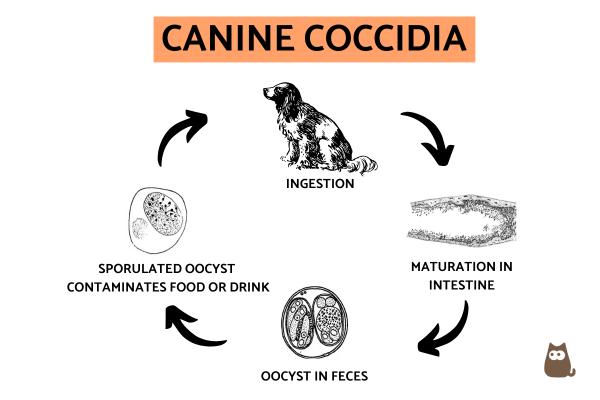What Is Coccidia in Dogs?



See files for Dogs
Coccidiosis in dogs is a disease caused by protozoan parasites called coccidia. It is characterized by the presence of diarrhea. This disease is especially serious when it affects puppies. Proper diagnosis and treatment, concluded by a veterinarian, is necessary.
In this AnimalWised article we are going to elaborate on what is coccidia in dogs, as well as talk about the symptoms and treatment.
What is coccidiosis in dogs?
As we have said, parasitic protozoa, also known as coccidia, are responsible for this disease. This will affect the dog's digestive system. Coccidia can be found in the feces of infected animals and in the environment, hence the importance of cleanliness.
A few days after ingesting coccidia, their oocytes already appear in the feces with the ability to infect. The symptoms also begin. Cured dogs become carriers. The diagnosis is made by observing the oocysts in the feces, using a microscope.
Symptoms of coccidiosis in dogs
Diarrhea is the most recognizable symptom of coccidiosis. In any case, the disease tends to be mild and asymptomatic. Other symptoms include:
- Lethargy and weakness
- Dehydration
- Abdominal discomfort and tenderness
- Vomiting
- Weight loss
- Little or no appetite
As we say, the main symptom will be diarrhea, which will start slightly but will end up producing a stool with mucus and blood. The dog may also stop eating, feel weak, and become dehydrated. If you see these symptoms in your dog, it's best to take them to the veterinarian as soon as possible to be properly diagnosed and treated.
Treatment of coccidiosis in dogs
Once our veterinarian confirms the diagnosis, they will also determine the treatment to eliminate the coccidia. There are many antibiotics that can be effective, however, the vet will choose the most suitable for your dog. In addition, in cases where considerable dehydration has occurred, it is necessary to replace fluids. Hydration will be very important in your dog's recovery. Usually, this involves the introduction of fluid therapy for your dog until they recover.
Hospitalization is needed especially when treating puppies. To avoid re-infestation one must implement preventive measures, as we will explain in the next section. We must treat all carrier dogs even if they do not show symptoms as this disease is contagious.

How to prevent coccidiosis in dogs?
We have seen that coccidiosis takes advantage of poor living conditions both in the dog (malnutrition, concurrent diseases, etc.) and in their environment. Thus, to prevent it from happening again, we must keep the places where the dogs are housed in good sanitary conditions. We must also keep the animals clean, dewormed and well fed.
As this problem especially affects young puppies still living together with their mother, we must take extra care in cleaning their nest. We can do this by making sure that the temperature is right, so they are never cold, and have enough space for the number of dogs there are. This is because overcrowding is a risk factor. Puppies can be infected if they are not in the right conditions, and also through their mother.
In addition to establishing an adequate hygienic environment, it is necessary to take care of the dog's health. This is because we know that coccidiosis can give symptoms when other diseases manifest, we need them to be healthy overall. This means taking them to the veterinarian for their regular check-ups and keeping up with their deworming and vaccination schedule.
If your dog has already been infected, it's important to take these health and safety measures into account to avoid re-infestation. Consult with your veterinarian for more information.
This article is purely informative. AnimalWised does not have the authority to prescribe any veterinary treatment or create a diagnosis. We invite you to take your pet to the veterinarian if they are suffering from any condition or pain.
If you want to read similar articles to What Is Coccidia in Dogs?, we recommend you visit our Parasitic diseases category.
- P.B McKenna & W.A.G Charleston (1980) Coccidia (protozoa: sporozoasida) of cats and dogs IV. Identity and prevalence in dogs, New Zealand Veterinary Journal, 28:7, 128-130, DOI: 10.1080/00480169.1980.34722






